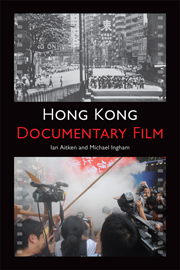Book contents
- Frontmatter
- Contents
- Introduction
- 1 Hong Kong, Britain, China: The Documentary Film, 1896–1941, A Page of History (1941) and The Battle of Shanghai (1937)
- 2 Hong Kong, Britain, China: The Documentary Film, 1947–69, the ‘Picturesque’ Committed Film and Water Comes over the Hills from the East (1965)
- 3 Colonial Film: The Development of Official Film–making in Hong Kong, 1945–73, the Hong Kong Film Unit (1959–73) and This is Hong Kong (1961)
- 4 Public-service Broadcasting in an Authoritarian Setting: The Case of Radio Television Hong Kong and the Development of Television Documentary Film in Hong Kong
- 5 The Documentary Films of Radio Television Hong Kong (RTHK) and The Hong Kong Case (1989)
- 6 Aesthetics and Radicalism: An Overview of Independent Documentary Film in Hong Kong, 1973–2013
- 7 A Critical Analysis of Significant Independent Documentary Films of the Past Three Decades
- Conclusions: The Future of Independent Documentary Film in Hong Kong, China and the Region
- Bibliography
- Index
Conclusions: The Future of Independent Documentary Film in Hong Kong, China and the Region
Published online by Cambridge University Press: 05 September 2014
- Frontmatter
- Contents
- Introduction
- 1 Hong Kong, Britain, China: The Documentary Film, 1896–1941, A Page of History (1941) and The Battle of Shanghai (1937)
- 2 Hong Kong, Britain, China: The Documentary Film, 1947–69, the ‘Picturesque’ Committed Film and Water Comes over the Hills from the East (1965)
- 3 Colonial Film: The Development of Official Film–making in Hong Kong, 1945–73, the Hong Kong Film Unit (1959–73) and This is Hong Kong (1961)
- 4 Public-service Broadcasting in an Authoritarian Setting: The Case of Radio Television Hong Kong and the Development of Television Documentary Film in Hong Kong
- 5 The Documentary Films of Radio Television Hong Kong (RTHK) and The Hong Kong Case (1989)
- 6 Aesthetics and Radicalism: An Overview of Independent Documentary Film in Hong Kong, 1973–2013
- 7 A Critical Analysis of Significant Independent Documentary Films of the Past Three Decades
- Conclusions: The Future of Independent Documentary Film in Hong Kong, China and the Region
- Bibliography
- Index
Summary
According to Michael Chanan:
In short, despite appearances, so to speak, documentary has a power, if not directly to reveal the invisible, nonetheless to speak of things that orthodoxy and conservatism, power and authority, would rather we didn't know and didn't think about. And this is exactly why we need it.
Chanan's timely reminder why a thriving documentary practice is important in any civilised society relates to his experience of documentary-making during the vicious civil war fuelled by the United States government during the 1980s in El Salvador. However, it also applies to the Hong Kong situation, even if the conditions for making documentaries in Hong Kong and around the region are not usually so hazardous. Bearing in mind the inevitable convergence between Hong Kong and China, culminating in the 2047 date for complete reintegration, it is essential for Hong Kong to build on the strong recent developments in independent film, as well as encouraging new digital online platforms for documentaries, which both democratise the form and contribute to a healthy and diverse public discourse on socio-political matters. As Chris Berry has observed in relation to independent film-makers in general and Tammy Cheung's documentaries in particular:
If we apply a broader definition, including documentary, short films and animation, it may be more accurate to consider the cinema of Hong Kong as undergoing a transformation. The development of Tammy Cheung's career as an independent documentarian is a part of this glass half-full/half-empty situation.
- Type
- Chapter
- Information
- Hong Kong Documentary Film , pp. 221 - 225Publisher: Edinburgh University PressPrint publication year: 2014

